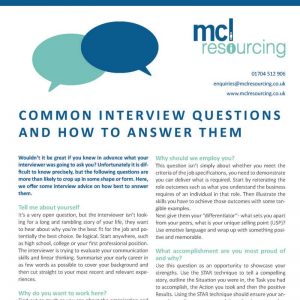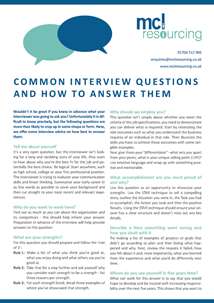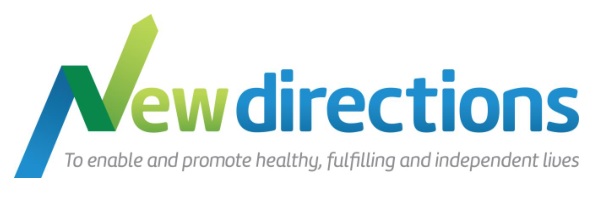

MCL Resourcing’s Common Interview Questions and how to Answer Them
Posted on 21 May 2017
Download our Common Interview Questions and how to Answer Them here!
Wouldn’t it be great if you knew in advance what your interviewer was going to ask you? Unfortunately it is difficult to know precisely, but the following questions are more than likely to crop up in some shape or form. Here, we offer some interview advice on how best to answer them…
Tell me about yourself
It’s a very open question, but the interviewer isn’t looking for a long and rambling story of your life, they want to hear about why you’re the best fit for the job and potentially the best choice. Be logical. Start anywhere, such as high school, college or your first professional position. The interviewer is trying to evaluate your communication skills and linear thinking. Summarise your early career in as few words as possible to cover your background and then cut straight to your most recent and relevant experiences.
Why do you want to work here?
Find out as much as you can about the organisation and its competitors – this should help inform your answer. Preparation in advance of the interview will help provide answers to this question
What are your strengths?
For this question you should prepare and follow the ‘rule of 3’:
Rule 1: Make a list of what you think you’re good at, what you enjoy doing and what others say you’re good at.
Rule 2: Take that list a step further and ask yourself why you consider each strength to be a strength – list three reasons per strength.
Rule 3: For each strength listed, detail three examples of where you’ve showcased that strength.
Why should we employ you?
This question isn’t simply about whether you meet the criteria of the job specifications, you need to demonstrate you can deliver what is required. Start by reiterating the role outcomes such as what you understand the business requires of an individual in that role. Then illustrate the skills you have to achieve those outcomes with some tangible examples. Next give them your “differentiator”- what sets you apart from your peers, what is your unique selling point (USP)? Use emotive language and wrap up with something positive and memorable.
What accomplishment are you most proud of and why?
Use this question as an opportunity to showcase your strengths. Use the STAR technique to tell a compelling story, outline the Situation you were in, the Task you had to accomplish, the Action you took and then the positive Results. Using the STAR technique should ensure your answer has a clear structure and doesn’t miss out any key details.
Describe a time something went wrong and how you dealt with it
Try making a list of examples of projects or goals that didn’t go according to plan and then listing what happened and why. Next, review the reasons it failed, how you felt about it and, most importantly, what you learned from the experience and what you’d do differently next time.
Where do you see yourself in five years time?
What can work for this answer is to say that you would hope to develop and be trusted with increasing responsibility over the next five years. This shows that you want tobe recognised as someone who does an excellent job and that this would underpin any career development and promotional opportunities.
What motivates you?
Perhaps you might like a challenge? Or you want a job that pays enough for interesting foreign travel? There is no right or wrong, but honesty, enthusiasm and self-belief are qualities a recruiter will hope to see reflected in the answers.
Have you got any questions?
Remember that interviews are a two-way process. Try to at least have one or two questions about the company or working there. Ask about the company and the opportunities for personal development and, of course, ask more about the role, its challenges and the team. Questions directed at the interviewer themselves are a good move too, what do they like about their job, the company, the culture?
Why are you leaving your current position?
This is a very critical question. Don’t bad mouth your previous employer or co-workers or sound too opportunistic. It’s fine to mention major problems, a buy-out or a shutdown. You may want to state that after long personal consideration, your chance to make a contribution is very low due to extensive company-wide changes.
What do you consider your most significant accomplishment?
A good answer to this question can get you the job. Prepare extensively—discuss hard work, long hours, pressure and important company issues at stake. You may want to give an example, discussing personal involvement.
Why do you believe you are qualified for this position?
Pick two or three main factors about the job and about yourself that are most relevant. You may mention a technical skill, a management skill and/or a personal success story.
What do you like/dislike most about your current or last position?
The interviewer is trying to determine compatibility with the open position. Be careful; it’s safe to say that you like challenges, pressure situations, opportunities to grow.
How do you handle pressure? Do you like or dislike these situations?
High achievers tend to perform well in high-pressure situations. Conversely, these questions could imply that the open position is pressure-packed and out of control. Know what you’re getting into. If you do perform well under stress, provide a good, detailed example. Be descriptive. The sign of a good employee is the ability to take initiative.
Can you describe a situation where you did this?
The proactive, results-oriented person doesn’t have to be told what to do. To convince the interviewer you possess this trait, give a series of short examples describing your self-motivation. Discuss one example in-depth, describing the extra effort, your strong work ethic and your creative, resourceful side.
Deadlines, frustrations, difficult people and silly rules can make a job difficult. How do you handle these types of situations?
Most companies, unfortunately, face these problems daily. If you can’t deal with petty problems, you’ll be seen as uncooperative. How you overcome these are important. Diplomacy, perseverance and common sense will prevail in difficult circumstances.
Why should we hire you for this position? What kinds of contributions would you make?
This is a good chance to summarise. By now, you should know the key problems. Restate and show how you would address them. Don’t be arrogant—instead demonstrate a thoughtful, organised and strong attitude.
Back to News










